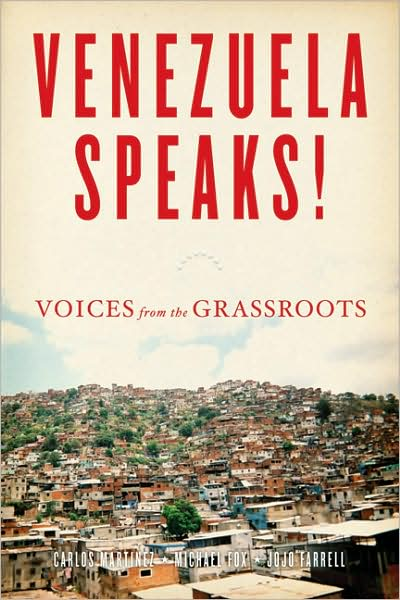
Editors: Carlos Martinez, Michael Fox and JoJo Farrell
Paperback, 320 pages
Publisher: PM Press, 2010
One thing is certain about Venezuela Speaks! Voices from the Grassroots: it delivers on its title’s promise. The book offers perspectives from twenty-nine activists from across the country on politics, economics, history, and culture—in candid, concise, and inspiring narratives.
As Editors Carlos Martinez, Michael Fox, and JoJo Farrell state in the introduction, one purpose of the book is to counter “the oversimplified understanding of the way in which the Bolivarian Revolution is actually playing out.” This oversimplification, as exemplified in the US, pits a dictator (in the form of President Hugo Chavez) versus democracy, with the country’s 26 million residents characterized as socialist or capitalist, pro-Chavez or anti-Chavez.
Though the featured speakers in this text do share a common support of Chavez and the Bolivarian programs, most speak in frank terms about the bureaucratic obstacles that remain within the government. There is no attempt to hide criticisms about shortcomings and failings since Chavez came to office in 1998. Nonetheless, there is an underlying optimism throughout the text, and a sentiment that no single person (including Chavez) is more important than the whole; everyone is part of the process and must continue to work.
The book is divided into seven parts, each covering a sector of political activism in contemporary Venezuela: land and housing reform; women and sexual diversity; workers and labor; community media, arts and culture; Indigenous and Afro-Venezuelan movements; the student movement; and community organizing. The work of the interviewees covers a wide range of these sectors.
Venezuela Speaks! presents the Bolivarian Revolution as a symbiosis between a President with a clear plan and a movement putting it in to action. Housing activist Iraida Morocima states, “Chavez is a door—a door for the struggles that we want to carry out.” Morocima is a member of the 5 de Julio Pioneer Camp, which is one of many Urban Land Committees fighting for housing ownership in Caracas’s barrios.
Locally focused as they are, the activists do weigh in on broader issues, including international ones. Maria Vicenta Davila, a communal council member in the Rangel Municipality of the Andean region—one of 30,000 such councils throughout the country working to connect people to funds and resources—made pointed observations about American war-profiteering corporations and US military interventions.
The book is organized in a manner that highlights the fluidity and connectivity of issues in Venezuela. The editors present an opening to each section, often with rich sensory detail, in order to provide specific context and backgrounds, and within each section are chapters focusing on particular communities or organizations, with sub-sections providing depth and scope to the speakers’ accounts.
Overall, the text has a documentary style, rather than the feel of hard investigative journalism. While the editors make clear that too much media coverage narrowly focuses on pro vs. anti-Chavez sound bites, wanting to avoid this in their approach, I did find myself wanting to see a microphone, figuratively speaking, stuck in the face of some government or corporate representative rather than relying on collected news clips for a perspective outside that of the activists’. Nonetheless, a solid, informative framework is present throughout the book.
This framework includes an “Introductory History,” which is almost obligatory when covering Venezuela—it entails Columbus’s arrival in 1498 and the ensuing slaughter of indigenous tribes by the Spanish during the 16th and 17th centuries; the arrival of African slaves during the 18th century; the rise of Simón Bolívar and the freedom fighters against the Spanish empire in the 19th century; the political and economic influence of the United States during the 20th century; Hugo Chavez’s arrival as leader of a failed civilian-military coup in 1992, and his presidency from 1998 onward. This history serves to emphasize the point that resistance has been a part of Venezuela long before Hugo Chavez.
The prologue, by Greg Wilpert, identifies Venezuela’s position within the paradigm of resistance to neoliberal policies that have wracked Latin America since the 1970s. Wilpert reminds the reader of U.S.’s disgraceful history in the region, including the backing of Pinochet’s right-wing dictatorship in Chile, and lays responsibility on the International Monetary Fund for economic collapses in Argentina and Mexico. He concludes that “making sense of and defending what is happening in Venezuela is perhaps one of the most important tasks for progressives around the world today.”
I personally agree with this position, and my enthusiasm for the subject is only bolstered having read this book. While it is not the definitive history, evaluation, or investigation of Venezuela, the reader begins to see the links, rather than the differences, between our respective countries. Attacks on public organizing and movements for social change are far from absent in US history, and recent events remind us that the struggle is never over. The determination and practicality expressed in these accounts provide not only inspiration, but also a working blueprint on how grassroots work can be done here—or in any community.






